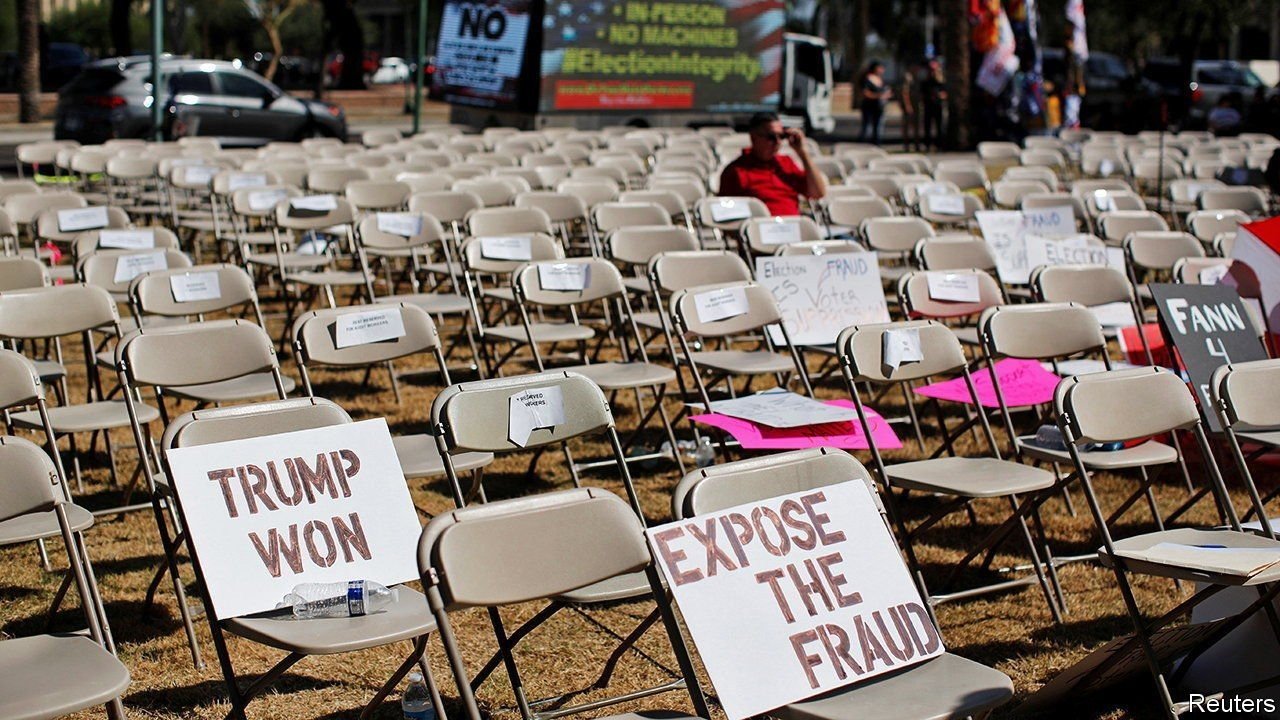The Republican response to an absurd recount in Arizona underscores a threat to democracy

IT WAS SUPPOSED to be the start of the glorious restoration. At the behest of Donald Trump, who has been unable to come to terms with his election loss, Republicans in Arizona announced an unprecedented “audit” of millions of ballots cast in 2020, with the aim of exposing the alleged enormity of Democratic-favouring vote-rigging. Its results would prove massive fraud, the president promised. It would be the first domino to fall, the QAnon-aligned conspiracists in the party pledged. The reality was a let-down, but this seems to have had no effect on the story spun-up by Republicans about voter fraud.
The Republican-led state senate instigated the audit by subpoenaing 2.1m ballots cast in Maricopa County, which includes Phoenix, the state’s largest city. It outsourced the logistics to an outfit called the Cyber Ninjas with no prior election-auditing experience and led by an enthusiast of Mr Trump’s “stop the steal” movement. The majority of the $6m raised for the recounting, which took place in a cavernous convention hall in Phoenix, was raised privately by ardent partisans. Republican lawmakers in other states that Mr Trump had narrowly lost—like Georgia, Pennsylvania and Wisconsin—visited and returned inspired to start similar efforts. As the effort stretched months past its intended conclusion, the time of the promised Trump presidential restoration drifted, like the rapture, past its promised date of August 13th. On September 24th, its conclusions were finally presented to the state senate.
They were underwhelming. The Cyber Ninjas were not able to detect the avalanche of fraud that Mr Trump had been promising. In fact, their final verdict was that Mr Biden’s margin of victory was very slightly higher than officially certified. That inconvenient conclusion was buried in a three-volume report largely devoted to raising doubts about the legitimacy of the election. For example, it insinuates that 10,000 voters may have voted in other counties. A more banal explanation is that in a state with 7m people, a small number will have identical names and birth years.
Yet Mr Trump was not the least bit chastened by the results. Instead, he ignored the findings and declared it a complete victory. “We won on the Arizona forensic audit yesterday on a level you wouldn’t believe,” he said in a rally in Georgia (where he also berated the sitting Republican governor for his unwillingness to help him engineer a reversal of his loss in that state). Mr Trump falsely claimed that the results mandated the decertification of his loss in Arizona. His most ardent devotees have not dwelt much on why such a motivated exercise could still turn up naught. Mark Finchem, a conspiracy-minded Republican in Arizona who is running to be the chief elections officer in the state, repeated his call for decertification, demanded the arrest of election officials he says tampered with the results and argued for a subsequent audit in Pima County (home to Tucson, the state’s second city).
Meanwhile the Republican quest to delegitimise elections in the name of upholding their integrity carries on. Efforts in other states to conduct similar audits have not been suspended. Their number grew when, seemingly in response to Mr Trump’s demands on September 23rd for more audits, the office of the Texas secretary of state, which oversees elections, announced its own “comprehensive forensic audit” in four large counties.
The aftermath of the failed Arizona audit illustrates how sorry a state one of the country’s two main parties finds itself in, still under Mr Trump’s spell and still with a lukewarm commitment to basic democratic processes. The fraudulence of the effort to “stop the steal” was apparent from the start. Mr Trump’s campaign’s allegations of a widespread voter-fraud conspiracy were laughed out of most federal courtrooms. Yet the fresh humiliation of the Arizona audit changes nothing for “the president” (a title he and his acolytes still insist on using). Rather than disavow the most serious threat to American democracy of the modern era, most elected Republicans still remain unable to denounce it. There has been no serious reckoning within the party even after an angry mob spurred by the conspiracies of its dear leader stormed the Capitol on January 6th in an attempt to overturn a legitimate election.
Much energy has instead been focused on purging Mr Trump’s critics: Liz Cheney was ejected from Republican leadership in the House of Representatives for her continued criticism. The ten Republicans who voted to impeach Mr Trump over his actions on January 6th are all facing primary challengers that the ex-president has whipped up. Few seem likely to remain in office past the coming elections in November 2022. Mr Trump’s toxic legacy—of violating the essential democratic norm that losers should concede, and misleading voters into thinking the other side cheats and steals elections—shows no sign of ending soon.■
For more coverage of Joe Biden’s presidency, visit our dedicated hub
This article appeared in the United States section of the print edition under the headline “Still stopping the steal”
*** This article has been archived for your research. The original version from The Economist can be found here ***


